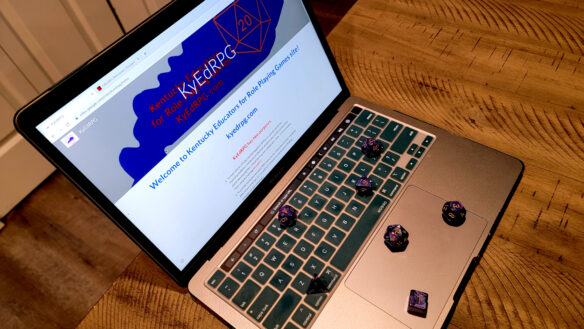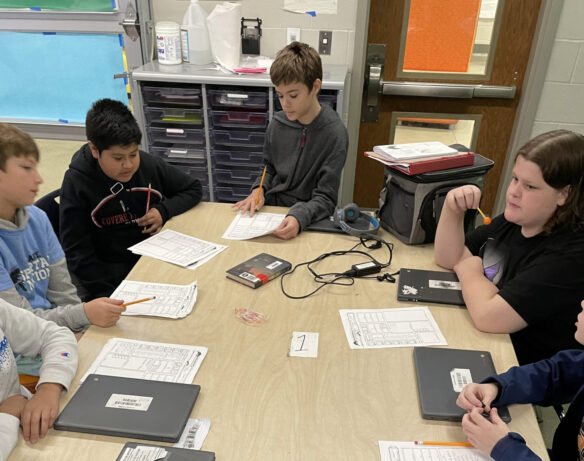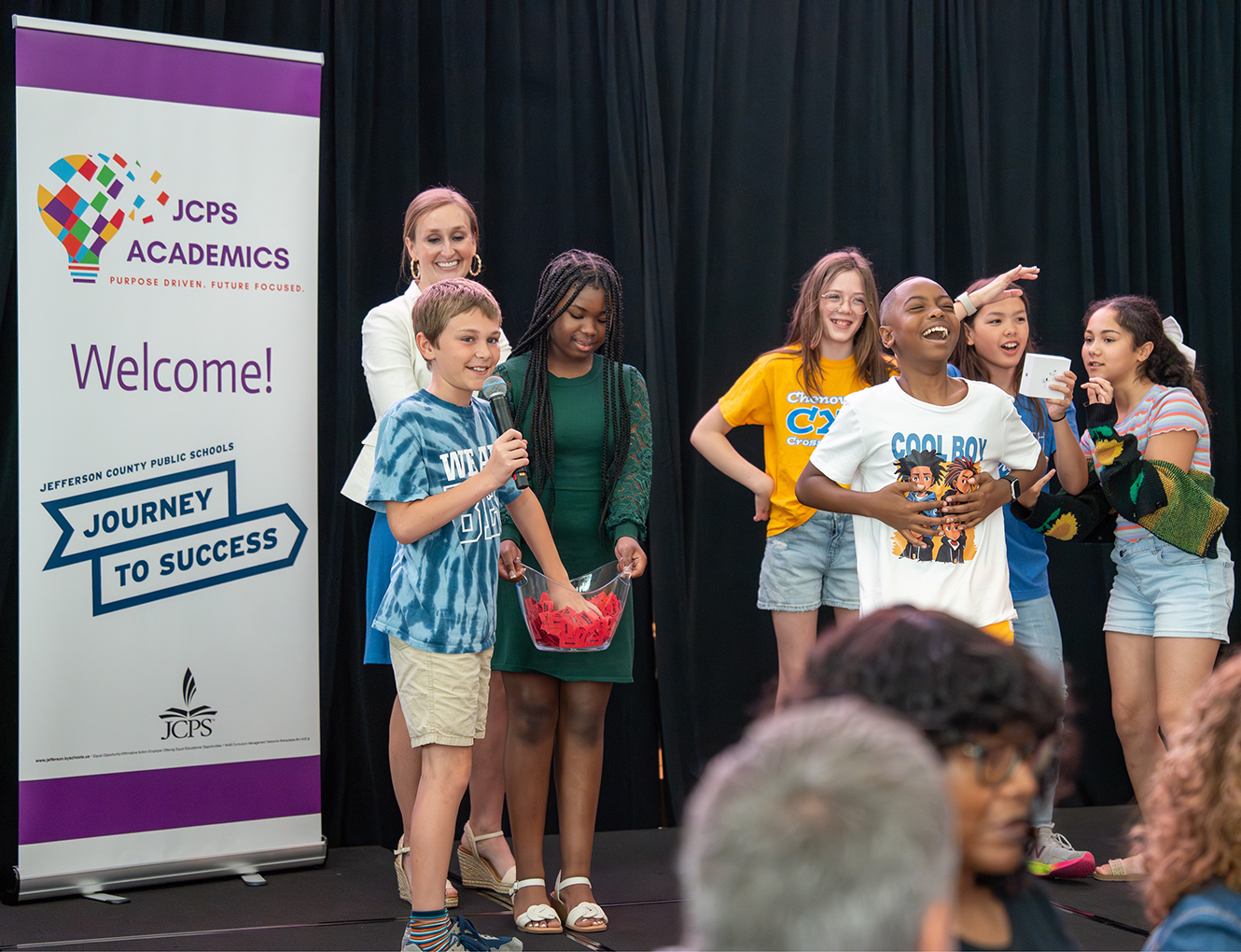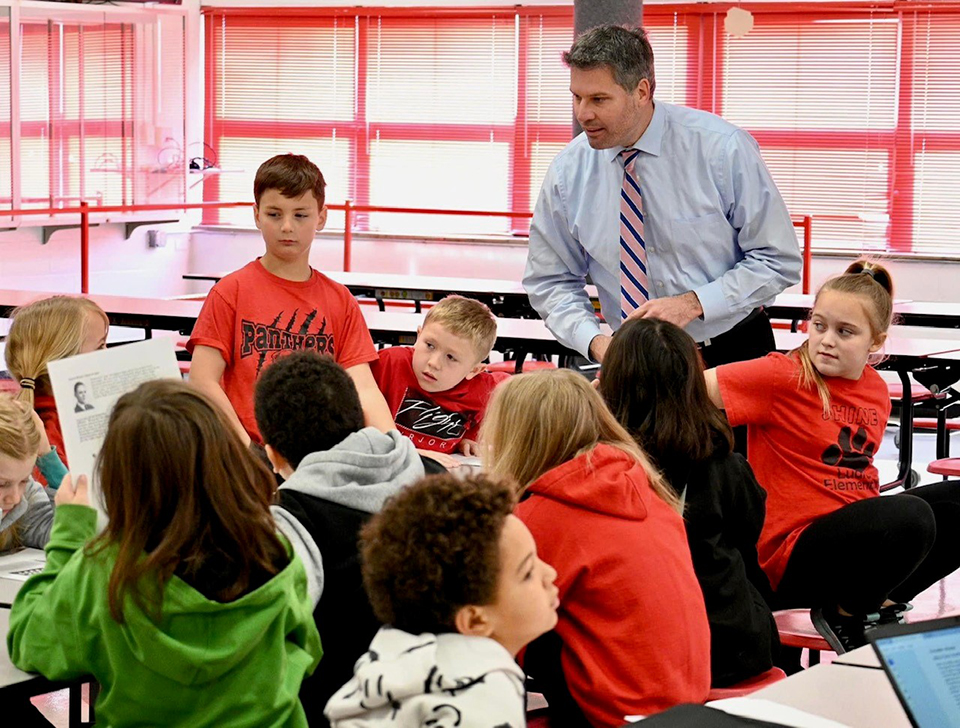
The Kentucky Educators for Role Playing Games, launched in 2022, provides resources to educators to show how role-playing games like Dungeons & Dragons can enrich student learning experiences. Submitted photo by Adam Watson.
Many people know Justin Gadd as a 6th grade social studies and English language arts teacher at Marnel C. Moorman Middle School (Shelby County). A few know him as a bard named Farrohk.
Gadd has been participating in a Dungeons & Dragons (D&D) campaign with friends for four years. Established in 1974, D&D is a popular fantasy role-playing game where players embark on adventures cultivated by dice, paper and pencil, math and imagination. Now, as an educator, Gadd uses D&D as a pathway for deeper learning experiences for his students.
“I love D&D and it gives me some time to spend with friends twice a month and just laugh and have adventures,” he said. “Any chance I get as an educator to share that fun with others is a great day.”
When COVID-19 shut down in-person learning experiences, Gadd and co-workers at his former school system, Oldham County Schools, decided they wanted to create something fun, free and engaging for students stuck at home on virtual learning. The D&D club met every week.
He brought his experience running a D&D club with him when he transitioned to Shelby County Schools and started one there. Gadd believes role-playing games like D&D promote deeper levels of learning through project-based, experiential activities that help develop many of the skills in Shelby County’s Profile of a Graduate, including being a responsible collaborator, effective communicator and critical thinker.
“Teamwork is a huge part of what makes D&D fun. I remind my students that your party is your team and everyone has a job to do for you all to be successful,” he said. “It teaches them that even though we all may have different backgrounds, we can all work together to accomplish a goal. Academically, there’s creative writing, problem-solving, math, statistics, probability and more in the process of creating characters and managing actions during the game.”
Gadd is not the only Kentucky educator interested in bringing vibrant learning experiences through role-playing games to students. Adam Watson, a deeper learning design specialist for the Ohio Valley Educational Cooperative, created and launched the Kentucky Educators for Role Playing Games website in 2022. The site, along with a social media presence, promotes the positive impact of role-playing games in school, as well as educational resources to support this unique subset of game-based learning.
“As I began exploring game-based learning, I started seeing more and more examples of role-playing games being used in school settings, and while that might elicit surprise or skepticism, there is a growing body of scholastic papers and credentialed institutions offering proof of the instructional value,” said Watson.
“I think we as educators may sometimes be too quick to dismiss play, but the power of play to explore other perspectives, try out solutions, to engage new situations with joy, is not just engaging and fun but it is deeply instructive. In fact, when we think of deeper learning as an outcome of applying what we know in ways that are authentic and enduring, the power of play and game-based learning really becomes apparent.”

The Dungeons and Dragons club at Shelby County Schools provides students with an opportunity for game-based learning, helping them develop many of the skills in Shelby County’s Profile of a Graduate. Photo submitted by Justin Gadd.
Game-based learning can take on different forms. Patrick La Mar, a social studies teacher at North Oldham High School (Oldham County), created his own version of a role-playing game by combining D&D and The Oregon Trail, a popular computer game that also was created in the 1970s, to discuss westward expansion. The Oregon Trail was originally invented to teach students about life as a pioneer on the Oregon Trail, leading the player through a series of obstacles as they work to settle west in 1848.
The idea sparked for La Mar after an observation with a principal as the pair discussed ways to make the curriculum unit on Manifest Destiny more engaging for students. At the time, La Mar was leading the D&D club and realized with the Oregon Trail lesson coming up, he could combine the two games.
“I thought through it, and [students] are going to meet different encounters for situations like in D&D. If you remember the old computer game, people have different jobs like banker, carpenter. Those can be like the classes in D&D,” he said. “Obviously certain people are going to have a better time resolving those than others. I just went from there, trying to keep it as simple as I could but still reflecting the ideas and actors of D&D.”
La Mar said students were receptive to the activity and it provided opportunities for students to reflect on the experience individually and collectively at the end of the lesson.
“They liked the different encounters,” he said. “Okay, we’ve broken a wheel. Are we able to fix it or if we don’t, what could happen to us?”
For educators looking to introduce role-playing games, Gadd suggests doing some research through the D&D resources for educators website. He also encourages teachers to not be afraid of having a perfect lesson and encouraging students to be active participants.
“D&D has a lot of improvisation in it, and your students will have fun and don’t know when you mess up,” Gadd said.
La Mar agrees, adding that trying to get kids to role play, whether it is a game or not, can help students develop empathy.
“Most students have a hard time, both middle school and high school today, empathizing with literary characters and historical people,” he said. “[It’s important] just getting them to recognize what are people’s motivations, and based on their motivations, how are they going to respond when certain things happen to them.”



Leave A Comment